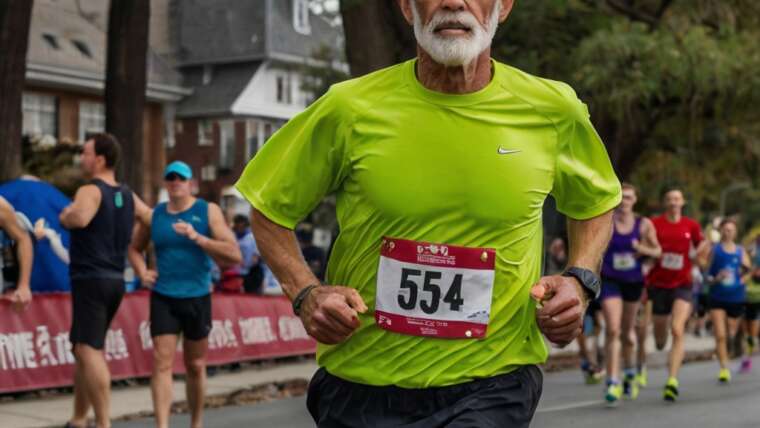Marathon walking needs commitment, smart preparation, and good time management. You now know about completion times, pacing strategies, and training methods to take on this amazing challenge. Most people finish the distance in 6-8 hours, and with the right preparation, you can reach this goal too.
Many people think walking a marathon is easier than running one. Yet covering 26.2 miles on foot stands as a remarkable achievement that needs proper preparation and realistic timing.
The time commitment plays a significant role in your success, whether you’re planning your first full marathon or starting with a half marathon distance. A steady walking pace allows most participants to finish a marathon in 6 to 8 hours. Half marathon walkers typically cross the finish line in 3 to 4 hours.
This complete guide shows you how different factors affect your marathon walking time. You’ll learn to develop effective pacing strategies and create a training plan that aligns with your goals. The guide covers everything from energy management to handling various weather conditions and terrains.

Table of Contents
- 1 Understanding Marathon Walking Times
- 2 Factors Affecting Marathon Walking Speed
- 3 Essential Pacing Strategies
- 4 Training for Your Target Time
- 5 Race Day Time Management
- 6 Here are some FAQs about how long does it take to walk a marathon:
- 6.1 Is 2 hours for a half marathon good?
- 6.2 What percentage of the population can run a sub-2 hour half marathon?
- 6.3 What is a good half marathon pace in kilometers?
- 6.4 What pace is a 2 hour 50 minute marathon?
- 6.5 How to run 21km in 2 hours?
- 6.6 What is a realistic half marathon time?
- 6.7 What pace is 21km in 2 hours?
- 6.8 What is elite half marathon time?
- 6.9 Is 7 minutes per kilometer good?
- 6.10 What pace strategy for 2 hour half marathon?
- 6.11 Can you walk a half marathon in 2 hours?
- 6.12 Can I run 21km without training?
- 6.13 Do elite runners drink during half marathon?
- 6.14 Can the average person run a half marathon?
- 6.15 What is a good beginner pace for a half marathon?
Understanding Marathon Walking Times
Your marathon completion time helps you set realistic goals and create an effective training plan. Let’s look at what you can expect based on several factors that influence your walking pace.
Average completion times by fitness level
Your fitness level is a vital factor in determining your marathon walking time. Most walkers finish a marathon in 6 to 8 hours. Experienced fitness walkers tend to finish closer to the 6-hour mark. Here’s what you can expect based on your fitness level:
- Beginners: 6.5-7 hours
- Regular fitness walkers: 6-6.5 hours
- Advanced walkers: 5-6 hours
- Olympic-level race walkers: Under 3.5 hours
Effect of age and physical condition
Age affects marathon performance, but not as much as you might expect. The largest longitudinal study shows peak marathon performance happens around 34.3 years. Your physical condition and training status affect your performance more than your age.
Performance typically decreases by only 0.2% yearly for runners over 40, and walkers show similar patterns. Women tend to maintain their performance longer than men. The gender gap in marathon times narrows substantially after age 60.
Realistic time expectations for beginners
First-time marathon walkers usually maintain a pace of about 15-16 minutes per mile. This means a finishing time between 6.5 and 7 hours for most beginners. Your current fitness level and training consistency determine your completion time.
A 6-hour marathon needs you to maintain a 13:43 per mile pace, while a 7-hour finish requires a 16:01 per mile pace. Most marathon events set cut-off times around 6.5 to 7 hours. You need adequate training to meet these requirements.
Regular training over 3-4 months can improve your walking pace and endurance substantially. Your body’s efficiency in using energy develops through consistent training. This ended up affecting your marathon completion time more than age or gender.
Factors Affecting Marathon Walking Speed
Your marathon walking speed depends on several factors. Let’s explore them to help you prepare better for the challenge ahead.
Terrain and course elevation
The course profile affects your walking speed and finish time by a lot. Research shows that relatively flat courses with gentle descents, like the Berlin Marathon, lead to the fastest finishing times. Your body works harder and naturally slows down while walking uphill. The best performance comes from courses with elevation changes under 42 meters total, which is the maximum allowable drop for official record eligibility.
Weather conditions and their effect
Weather is a vital part of your marathon performance. Studies show that you’ll perform best in temperatures between 44-59°F (7-15°C). Here’s how different weather conditions affect your walking speed:
- Your performance drops by about 0.3-0.4% for each degree above the ideal temperature range
- Humidity levels affect performance by a lot and account for 26% of weather-related effects
- Solar radiation makes up 18% of weather impact, while wind speed influences 16% of weather-related performance changes
Personal fitness and experience level
Your fitness level and experience affect your walking speed by a lot. Research shows that slower participants tend to have more speed variation throughout the marathon. The effect of challenging conditions varies based on your fitness level. Heat and elevation changes affect less experienced walkers more.
Your pace will slow down by up to 30 seconds per mile to maintain the same effort level when you train at altitude (above 5,000 feet). This becomes more noticeable if you’re not used to high-altitude conditions. On top of that, it takes about 2-3 weeks for your body to adjust to higher elevations. Plan ahead if your marathon has major altitude changes.
Note that difficult terrain combined with tough weather will slow you down much more than walking on flat, paved surfaces in good conditions.
Essential Pacing Strategies
Your marathon pace plays a significant role in finishing strong. Let’s look at proven strategies that help you maintain steady progress throughout your 26.2-mile experience.
Calculating your optimal walking pace
The magic mile formula provides a reliable way to find your ideal marathon pace. You can multiply your brisk-paced mile time by 1.3 to determine your sustainable marathon pace. A 15-minute magic mile walk means your target marathon pace would be 19.5 minutes per mile.
Here’s how to calculate your target paces for different distances:
- 5K pace: Add 33 seconds to magic mile time
- 10K pace: Multiply magic mile by 1.15
- Half marathon: Multiply magic mile by 1.2
- Full marathon: Multiply magic mile by 1.3
Managing energy throughout the race
The run-walk method becomes your secret weapon to conserve energy. Studies show that strategic walk breaks can reduce marathon completion time by up to 13 minutes. This technique distributes workload across different muscle groups and stops early fatigue.
These run-walk ratios based on your target pace work best:
- 9:30-10:45 pace: 90 seconds run/30 seconds walk
- 10:45-12:15 pace: 60 seconds run/30 seconds walk
- 12:15-14:30 pace: 30 seconds run/30 seconds walk
When to adjust your pace
Your pace can change – knowing the right moments to adjust it can make your marathon experience better. Walk breaks let your body switch from anaerobic to aerobic metabolism and help clear lactic acid buildup. This metabolic change is vital to maintain steady energy levels throughout the race.
Key moments to adjust pace:
- Aid stations: Walk through them to ensure proper hydration
- Uphill sections: Maintain effort level rather than pace
- Downhill segments: Use gravity to your advantage and keep running if possible
Note that walk breaks work best when planned rather than forced by fatigue. Brief recovery periods early in the race save energy for the final miles. This strategy often lets you pass other runners who started too aggressively.
Training for Your Target Time
Marathon walk preparation needs a smart training approach that builds endurance and prevents injury. Let’s look at proven ways to help you hit your target time.
Building endurance gradually
Your marathon walking journey starts with progressive training. Studies show you can prevent overtraining while building stamina by increasing your weekly mileage by no more than 10%. Start with 20 miles per week and work your way up to 38 miles a few weeks before race day.
The run-walk method works great to build endurance. You can cover more distance and reduce fatigue with this approach. Many athletes have achieved personal records by using strategic walk intervals. Start with a 4-minute run to 1-minute walk ratio and adjust it based on how comfortable you feel.
Speed walking techniques
These key techniques will help boost your walking speed:
- Roll through each step from heel to toe
- Maintain proper arm motion for momentum
- Keep your core engaged
- Focus on smooth transitions between walking speeds
- Practice acceleration glider drills weekly
The final 6-10 weeks before the marathon should include “pace walks” covering 2-6 miles at your planned marathon pace. This helps your body adapt to race day demands.

Cross-training for better performance
Cross-training plays a vital role in marathon success and offers these benefits:
- Increases fat-burning potential
- Reduces injury risk through varied movement patterns
- Improves cardiovascular fitness without additional impact stress
- Strengthens supporting muscles
- Helps recovery between training sessions
Swimming, cycling, or strength training on non-walking days will give you optimal results. Research shows that cross-training helps maintain fitness while lowering the risk of overuse injuries common among endurance athletes.
Rest periods are crucial in your training schedule. Your body adapts most during recovery, especially after those long-distance training walks. Plan your training program with alternating shorter and longer days throughout the week. Schedule your 16 and 20-mile long walks strategically.
Race Day Time Management
Smart time management on race day determines your marathon success. Your pre-race routine and aid station stops play crucial roles in achieving your target finish time.
Pre-race preparation timeline
Your race day success starts well before the starting gun. You should wake up 3-4 hours before race start. This gives your body enough time to fuel and hydrate properly. Here’s your essential pre-race timeline:
- 4 hours before: Wake up and drink 4-6 ounces of water
- 3 hours before: Light meal if needed (test during training)
- 2 hours before: Final gear check and hydration
- 1 hour before: Arrive at race venue
- 30-40 minutes before: Begin warm-up routine
A cup of coffee 60-90 minutes before the start can boost your performance. But don’t try anything new on race day that you haven’t tested during training.
Aid station strategies
Aid stations serve as your lifeline during a marathon. You’ll find them every 2 miles (or 5km) along the course. These proven strategies help you maximize benefits while saving time:
Make eye contact with volunteers and clearly tell them what you need. As you approach aid stations:
- Decide what you need before arriving
- Listen for volunteers calling out available options
- Point to the volunteer you’re targeting
- Grab supplies while maintaining forward momentum
- Move to the side if you need to stop
Studies show that walking breaks at aid stations can reduce overall fatigue. This strategy could improve your finishing time by up to 13 minutes.
Managing breaks effectively
Your break management strategy can make or break your target time. Research indicates that planned walk breaks help maintain a consistent pace and prevent hitting the wall.
For optimal break management:
- Plan your intervals: Set predetermined run-walk ratios based on your fitness level
- Keep breaks brief: Most benefits occur within 30-60 seconds
- Use aid stations strategically: Combine planned breaks with hydration stops
- Maintain forward momentum: Even during walks, keep moving purposefully
Raise your hand and move to the side of the course when taking breaks. This courtesy keeps traffic flowing smoothly and prevents collisions with other runners.
Planned walking breaks work better than those taken from exhaustion. A systematic approach helps you maintain consistent pace throughout your marathon while managing your energy reserves effectively.
Your path to success lies in proven strategies – building endurance step by step, learning proper walking techniques, and creating a solid race day plan. The weather, terrain, and your fitness level are vital factors that affect your finishing time. You’ll keep your energy levels up throughout all 26.2 miles by pacing yourself through aid stations and taking smart walking breaks.
Walking a marathon is a chance to push your limits while reaching an impressive athletic goal. These techniques and insights will help you succeed, whether you want to hit a specific time or just cross the finish line. Your journey to becoming a marathon walker starts today. Stay consistent with your training, and you’ll soon join other successful marathon walkers.

